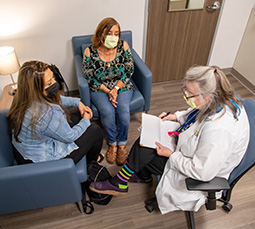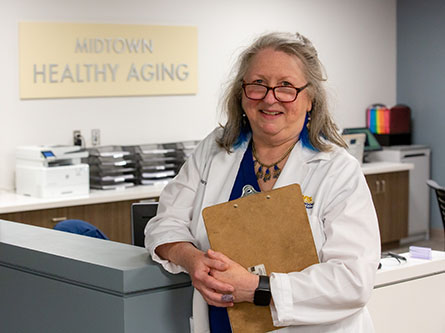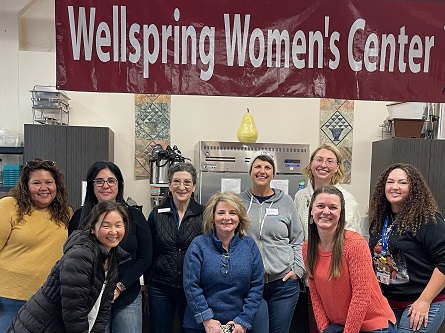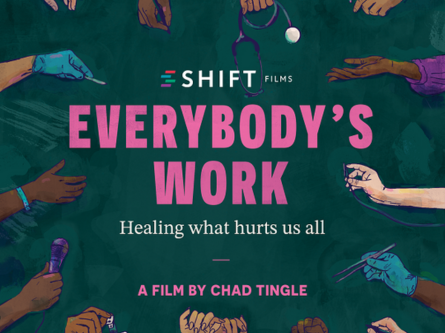By Theresa (Terri) Harvath (she/her/hers), PhD, RN, FAAN, FGSA
Professor & Senior Director for Strategic Initiatives
Director, Family Caregiving Institute
In January 2021, UC Davis Health opened the Healthy Aging Clinic in Midtown, launching an important pillar in the Healthy Aging Initiative that spans the entire health system. In that clinic we provide consultation for older adults and their family caregivers who may be facing the multiple challenges that can accompany advancing age (e.g., frailty and dementia). I am proud that UC Davis is making significant changes to how we care for frail older adults and their family caregivers. However, even as we become an Age-Friendly institution, each week we see reminders that older adults, especially older adults from historically marginalized communities, bore a disproportionate brunt of the COVID-19 pandemic.
As see vaccines for the coronavirus continue to roll out, we are envisioning what our lives may look like in this ‘new normal.’ I use quotations because I remain hopeful that we won’t try to return to a pre-pandemic way of life, but instead will use the lessons of the past year to reimagine how life and healthcare can be different, better, more equitable. In particular, I hope that we explore how the combination of advancing age and the social determinants of health can negatively affect an older person’s health and their responses to treatments.
We are also beginning to recognize the adverse impact that actions taken to contain the spread of infection during the pandemic have had on older persons. I recently read an opinion piece by Katie Engelhart in the New York Times (https://www.nytimes.com/2021/02/19/opinion/covid-dementia.html) decrying the fact that the safety measures we implemented in long-term care and healthcare to try to minimize the impact of the coronavirus (e.g., isolation, banning visitors) have themselves had harmful effects on the health and well-being of the very older persons they were intended to protect.

During my 40-year career in gerontological nursing, I have learned from many older patients that they believe we in healthcare over-estimate the risks involved in their choices (e.g., whether they are safe at home, wanting to climb a ladder or drive). Or that while the risks may be real, the infringement on their quality of life, their autonomy and their sense of control are also great and must be factored into any decision.
Perhaps what is most important as we move forward is that we try to recognize the limits of our ability to protect older adults from harm and to acknowledge that for most of us, maintaining our quality of life means taking on some risk. This is a theme that comes up weekly for me in my consultations with family caregivers. In visit after visit I hear about their struggle to balance protecting their older relative from the many threats that can accompany frailty, while at the same time, promoting some semblance of quality of life. Should they encourage their aged parent to attend a family wedding, knowing this may be the last time they get to see some relatives? Or should they prevent them from going, hoping this keeps them alive and well for longer?
It has been incredibly rewarding to return to clinical practice and work to support family caregivers in the important role they play in the care of frail older adults. When I first meet with a family caregiver and tell them that we want to support them as well as the older relative for whom they care, they often become emotional, telling me no one has ever recognized them before. For too long, family caregivers have been the invisible member of the interprofessional health care team. They bring a wealth of knowledge about the older person and their response to our treatment efforts, but we often take them for granted. My hope for our “new normal” is that we learn how to better incorporate the older person’s wishes and preferences, along with their family caregiver, in our healthcare delivery system. UC Davis Health is leading this effort through our Healthy Aging Initiative! If you’d like to find out more about this work, please go to our website: https://health.ucdavis.edu/aging/.





